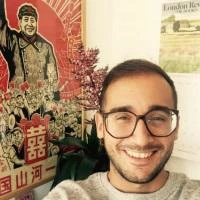
Connect
About
Andrea is a China-focused expert with twenty years of experience researching the dynamic interplay between society and the natural environment. His work addresses a series of interconnected questions: How are the environmental impacts of human projects distributed, and under what circumstances do successful counter-projects develop?
For his first ethnographic study, Andrea conducted fieldwork in Ming dynasty villages on the outskirts of Beijing, investigating how man-made water shortages spur environmentally induced migration among rural residents. The project's key contribution was its demonstration that migratory decisions are tied to changing perceptions of place, family, and work, alongside altered views of environmental and workplace hazards. The research outputs, including publications and a digital ethnography, illuminate how the material and symbolic destitution of historic rural communities is connected to China's current environmental challenges.
Andrea's second ethnographic project resulted in the book, Cutting the Mass Line: Water, Politics, and Climate in Southwest China. This work rethinks social science approaches to collective action by examining China’s water crises through the lens of Huize County, a multi-ethnic, ecologically damaged area of rural Yunnan. The research follows Chinese hydro-engineers, street-level bureaucrats, and rural residents as they navigate the challenges of the global environmental sustainability movement. Publications from this project explore the pragmatism and ethics of water bureaucrats, as well as counter-theories of property and the commons in rural China. Additionally, several of his publications focus on dispute mediation and grassroots collective action, specifically the jurisprudence of conflict management within an authoritarian system.
Since 2017, Andrea has led two new ethnographic projects: Extraordinary Responsibilities and PHOSSILISED (Phasing Out Fossil Fuels, Sinicising Energy Decolonisation). The first is an ongoing anthropology project on climate activist youth in Europe and Asia. It studies the prefigurative social, scientific, and juridical ‘worlding’ practices young activists use during global climate forums and disruptive collective action. The research explores what it means for activists to take on humanity’s largest collective problem, how they make sense of their political agency, and what kind of future world they hope to build. PHOSSILISED moves beyond the traditional Northern paradigm of climate change. It redefines global climate action through the lens of the People’s Republic of China’s commitment to assisting the Global South in decarbonising. As the largest climate polluter and biggest investor in climate solutions, China is assuming a leadership role. This project argues that China's unique energy history, which differs from the West's, offers a new model for developing countries to achieve energy abundance outside of a fossil fuel-dependent pathway, ultimately shaping global prospects for a more stable climate. Three co-authored research workshops, on the relation between Anthropology and Degrowth, on the Chinese energy industry and its plan to sustainably redesign the flow of the Mekong River, and on the theoretical impact of Global China on the social sciences, have provided material for these ongoing investigations.
The co-authored book, China as Context, which emerged out of this last workshop, notes that decades-old calls to recognise China's significance for anthropological theory and the social sciences are more urgent than ever. Drawing on East Asian postcolonial scholarship, this volume argues that without taking China seriously as a knowledge producer and a key agent in a post-global world, social scientists risk misinterpreting the global present. As Western globalisation wanes and anthropology reassesses the relationship between ethnography and theory, the book shows how "China" must be understood as an ordinary, integral context for research worldwide.
Andrea is deeply interested in public anthropology and the advocacy of open-access scholarship. In 2019, he organised an international workshop on Open Access, Academic Integrity and Academic Freedom and designed a new teaching module on Public Anthropology. He commissioned and edited the Association for Social Anthropologists of the UK’s 2023 report on the State of Anthropology in the UK.
Andrea is one of the founders of the Global China Lab, a non-profit organisation established by researchers and practitioners to advance knowledge of contemporary China. He is one of the co-editors of Made in China Journal, an open-access journal and online platform hosted by the Australian National University (ANU) and supported by a Marie Sklodowska-Curie Grant. He is also one of the founding members of the scholar-led editorial cooperative C40 and a contributor to the crowd-sourced digital tool The People’s Map of Global China. In 2016-2018, and again in 2022, with the support of the LSE Eden Centre and King’s College London, Andrea developed The Long Day of Young Peng, a bespoke point-and-click interactive digital ethnography that follows the day of a young Chinese migrant from his native village to Beijing. The Peng game was shortlisted for a prestigious 2023 QS Reimagine Education Award.
Since 2013, Andrea has taught courses in Political and Legal Anthropology, Anthropology and Human Rights, Culture and Globalisation, China in Comparative Perspective, Ethnography through Mixed Media, Public Anthropology and History of Anthropological Theory.
Expertise
Water; Law; China; Environment; Climate; Justice; Collective Action; Resistance; Sustainability; Bureaucracy; Energy; Mekong region